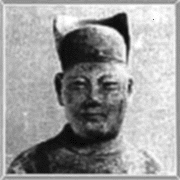 Tsai,
Lun,
is the inventor of paper. He lived and served as an official at the
Chinese Imperial Court at the Han Dynasty in China at about 1800
years ago. In or about the year 105 A.D., he presented Emperor Han Ho
Ti with samples of paper. Chinese records do mention and credit Tsai,
Lun with the invention of paper. His name is well known in China.
Tsai,
Lun,
is the inventor of paper. He lived and served as an official at the
Chinese Imperial Court at the Han Dynasty in China at about 1800
years ago. In or about the year 105 A.D., he presented Emperor Han Ho
Ti with samples of paper. Chinese records do mention and credit Tsai,
Lun with the invention of paper. His name is well known in China.
Tsai, Lun was a eunuch. Because he was an officer, he had the access to lots of resources, including money and human resources, for papermaking research. He was promoted by the Emperor for his invention and became wealthy. Later he got involved in palace intrigue, which led to his downfall. Finally he ended his life drinking poison.
It's hard to imagine how the world be like without paper. In China, before Tsai, Lun, books were made of bamboo, which were heavy and clumsy. Some books were made of silks, which were very expensive. In the West at that time, books were made of sheepskin or calfskin. Tsai, Lun improved the technology of making paper from sesame fiber. He used recycleable meterials such as bamboo, tree skin and shabby cloth to make paper. The technique of papermaking was kept as a secret for five centuries in China. In 751, some Chinese papermakers were captured by Arabs, and later paper was produced in the Middle East. The arts of papermaking gradually spread and in the twelfth century the Europeans learned the arts from the Arabs. Paper became the most common writing material in the West.
Today, paper is the most commonly used materials in human life, not just as a medium of communication. Tsai, Lun's contribution to civilization is priceless!
References
Hart, Michael (1978). Ts'ai Lun. In 100 A Ranking of the Most Influential Persons in History (pp36-41). New York: Hart Publishing Co.
Huang, Heng-Zheng (1981). The Invention of Paper. In Inventions and Discoveries of the World (pp83-87). Taipei, Taiwan: Yuan Liu Publishing Co.
This Page is Created by Dalang Fang.